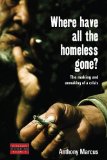

 |

|

The average rating for Where have All The Homeless Gone? based on 2 reviews is 4 stars.
Review # 1 was written on 2008-11-26 00:00:00 John Piegay John PiegayWhere have all the homeless gone? The making and unmaking of a crisis, by Anthony Marcus, explores the homeless crisis in the 1980s. He explores the rapid rise in public and scholarly attention to the homeless that started at the beginning of the 80s and how attention to this crisis rapidly disappeared by the beginning of the 90s. He turns a focused anthropological gaze onto who are the homeless and, more importantly, explores the reification of the category of homeless that academics, social works, and government policy makers focused their attention on. Why should we focus on why the homeless were carved out as a distinct category and offered assistance? Isn't that a good thing, i.e. identifying people who need help and helping them? The effort is good, but it's important to look at the bigger picture. Marcus writes that this delineation and laser-focus on the homeless has "left much of the theoretical debate on poverty in America focused on arguments over who the poor actually are and where they came from, rather than the politics of social inequity in America" (Marcus 2006: 60). Later on, he concludes that "a group of nonwhite urbanites who were often lacking in some combination of proper housing, medical care, education, and employment was reified and ethnicized into 'The Homeless' … Rather than identifying a concrete set of needs and life tasks bedeviling all working Americans and destroying the lives of my informations there were two nations that were imagined: those who made it over the bar that separated homeless and homeful and those who did not." (Marcus 2006: 147) Getting into the details, Marcus talks about food stamps and how while they offer assistance, they also create an alternative currency to delineate the other in America. I'd add that food stamps help render the poor visible. Poverty in America, especially in the post-Fordist era, has worked hard to push the poor into the shadows. Food stamps bring them into the light, albeit it's not a flattering light. Marcus did much of his research in shelters set up in New York City for transitional and permanent homeless people. He deconstructs the public reports of the disfunction and exotic behavior in shelters (e.g. surrounding open and/or homosexual relationships), positing that such behaviors are more the result of viewing private actions in the public spaces of shelters (Marcus 2006: 74). I'd note that public performative behavior is tiring cognitive work and such social performances cannot be kept up 24-7, blurring the line between public and private space. He devotes a chapter to black families and discussions around black homeless men and women. He takes on public discourses that ask why can't African American families act like recent immigrants, suck it up and make a better life for themselves. His thoughtful and detailed research shows that it's not fair to compare African American families to recent immigrant families. Black families grew up as Americans and thus have the same values, goals, and beliefs in what citizenship confers on them as white families. It's asking a lot, and perhaps too much, to demand that they give up their birthright to accept a different bill of rights that is conferred on recent immigrants. Marcus writes that "there are few American families that can comfortably incorporate high-functioning socially successful extended kin, much less those who have fallen on hard times and absorbed the quirks and liabilities that come with failure" (Marcus 2006:115). Overall, this is a fascinating book and one that you should check out if you're interested not only in the homeless but on how policy makers, activists, academics, and the public look at, react to, and comprehend social and economic crises in the United States. My only negative comment about the book is superficial: the font is horrible and makes reading difficult. |
Review # 2 was written on 2013-02-21 00:00:00 Adam Mcguire Adam McguireLoved concept. If there is black theology, Latino theology, theology of the oppressed, feminist theology; why do whites think that European male theology is "Theology"? Evidently, Perkinson is the first to write about this seriously. On the other hand, this was almost unreadable. Written for academic theologians with a hard to understand stream of consciousness style. Hope he or someone writes book for general public. |
CAN'T FIND WHAT YOU'RE LOOKING FOR? CLICK HERE!!!